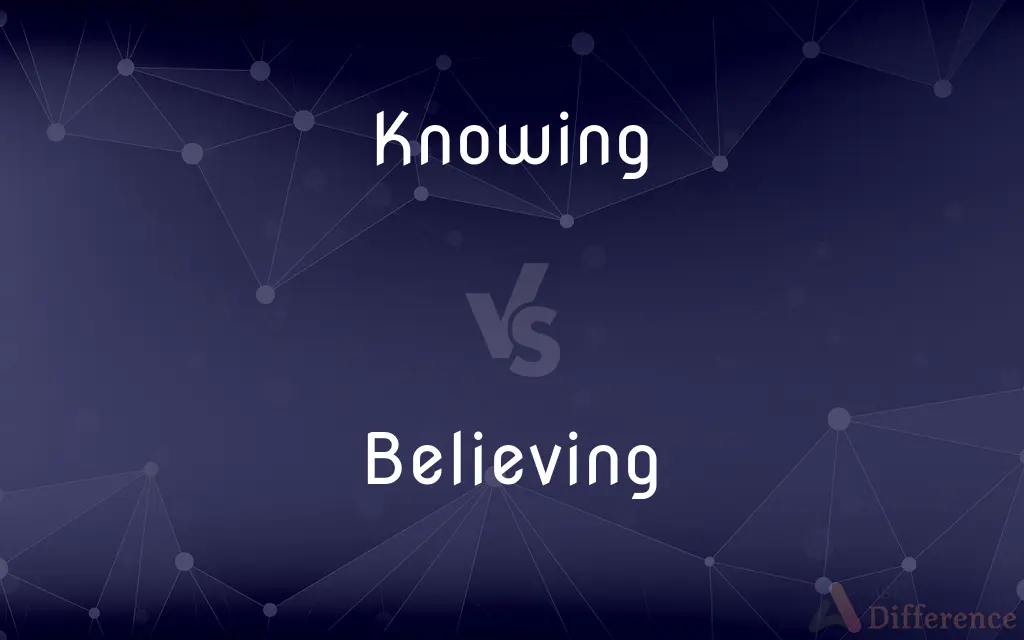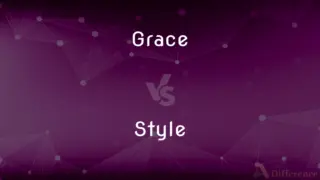Knowing vs. Believing — What's the Difference?
By Tayyaba Rehman — Updated on October 28, 2023
Knowing is certain understanding based on facts; Believing is accepting something as true without proof.

Difference Between Knowing and Believing
Table of Contents
ADVERTISEMENT
Key Differences
Knowing refers to the state of being aware or informed about something based on evidence, experience, or factual information. Believing, on the other hand, is the act of accepting or considering something as true, especially without direct evidence.
In Knowing, there's a level of certainty. It arises from data, experience, or tangible proof, making it concrete. Whereas in Believing, there might not be tangible evidence. It’s often influenced by trust, faith, or perception.
One can say that Knowing is objective. It's the result of learning or observing facts. Believing is more subjective, relying on personal feelings, convictions, or faith.
Knowing typically requires verification or evidence. For instance, we know the sky is blue during a sunny day because we see it. Believing might not need verification; for example, someone might believe in ghosts despite not having seen one.
While Knowing is a state of awareness confirmed by reality or facts, Believing is an attitude, a state of mind where one assumes something is true or trusts in a particular idea.
ADVERTISEMENT
Comparison Chart
Nature
Objective
Subjective
Basis
Facts, evidence, or experience
Trust, faith, or perception
Verification
Often requires verification
May not require direct verification
Certainty
Offers a high level of certainty
Might not offer the same certainty
Usage in Grammar
Often used as a verb describing awareness or familiarity
Often used as a verb indicating trust or acceptance
Compare with Definitions
Knowing
Recognizing or distinguishing something.
A knowing look passed between them.
Believing
Accepting something as true without concrete evidence.
He's believing in the goodness of people.
Knowing
Having information or knowledge about a subject.
She was knowing about ancient civilizations.
Believing
Trusting in someone or something.
She's believing in her team's potential.
Knowing
Being aware of something as a fact.
He had the knowing of a seasoned expert.
Believing
Having faith in a higher power or concept.
She's believing in destiny.
Knowing
Being certain or confident about something.
I tried to hide the surprise, but he gave me a knowing smile.
Believing
Feeling sure about a particular outcome.
He's believing that they will succeed.
Knowing
Possessing knowledge, information, or understanding
Very knowing about transportation costs.
Believing
To accept (something) as true or real
Do you believe his version of what happened?.
Knowing
Showing clever awareness and resourcefulness; shrewd and worldly
"Even so knowing a young ruffian as William Chaloner would have had no preparation for the shock of London" (Thomas Levenson).
Believing
To consider (someone) to be truthful or accurate in what they are saying
I believe you when you say that your neighbor is angry.
Knowing
Suggestive of secret or private knowledge
A knowing glance.
Believing
To expect or suppose; think
I believe it will snow tomorrow. I believe the letters to be authentic.
Knowing
Deliberate; conscious
A knowing attempt to defraud.
Believing
To have religious faith
He believes in God.
Knowing
(Archaic) Fashionable; stylish
"Many young men ... drove about town in very knowing gigs" (Jane Austen).
Believing
To have faith, confidence, or trust
I believe in your ability to solve the problem.
Knowing
Possessing knowledge or understanding; knowledgeable, intelligent.
Believing
To consider something to be important, worthwhile, or valuable
I believe in free speech.
Knowing
Deliberate, wilful.
Believing
Present participle of believe
Knowing
Shrewd or showing clever awareness; discerning.
A knowing rascal
Believing
The act or process of having faith, trust, or confidence in.
Knowing
Demonstrating knowledge of what is in fashion; stylish, chic.
Believing
Belief.
Knowing
The ability to know something without being taught.
Believing
That believes; having belief.
Knowing
Suggestive of private knowledge or understanding.
Believing
The cognitive process that leads to convictions;
Seeing is believing
Knowing
Given my knowledge about someone or something.
Knowing you, you would try not to be late for school.
Believing
Holding a particular opinion.
I'm believing that we can make a difference.
Knowing
Present participle of know
Knowing
The act or condition of having knowledge.
Knowing
Skilful; well informed; intelligent; as, a knowing man; a knowing dog.
The knowing and intelligent part of the world.
Knowing
Artful; cunning; as, a knowing rascal.
Knowing
Knowledge; hence, experience.
This sore nightHath trifled former knowings.
Knowing
Clear and certain mental apprehension
Knowing
Evidencing the possession of inside information
Knowing
By conscious design or purpose;
Intentional damage
A knowing attempt to defraud
A willful waste of time
Knowing
Alert and fully informed;
Politically aware
A knowing collector of rare books
The most...technically aware of the novelists under thirty
Surprisingly knowledgeable about what was going on
Knowing
Highly educated; having extensive information or understanding;
An enlightened public
Knowing instructors
A knowledgeable critic
A knowledgeable audience
Knowing
Being well-informed or well-versed in a subject.
By knowing the basics, he excelled in the competition.
Common Curiosities
Can beliefs change over time?
Yes, beliefs can evolve based on experiences, knowledge, or changing perspectives.
What is the primary difference between Knowing and Believing?
Knowing is being certain based on evidence or facts, while believing is accepting as true without concrete evidence.
Can you believe in something without knowing it to be true?
Yes, believing doesn't always require factual evidence, while knowing does.
Is knowing always 100% certain?
While knowing implies a higher degree of certainty, it's not always absolute, depending on the context.
Is it possible to know something but not believe it?
It's possible, especially when cognitive dissonance is involved – holding contradictory beliefs or values.
Can you provide an example of a sentence using both Knowing and Believing?
Knowing the challenges ahead, she kept believing in her dream.
Which is more subjective: Knowing or Believing?
Believing is more subjective, relying on personal feelings or perceptions.
Can beliefs be based on knowing?
Yes, beliefs can be influenced or formed based on what one knows.
Can knowing lead to believing?
Yes, gathering knowledge about something can solidify or shape one's beliefs.
How are knowing and believing used differently in everyday language?
Knowing often describes a state of awareness based on facts, while believing expresses trust, acceptance, or faith in something.
Do both knowing and believing require verification?
Knowing typically requires verification, while believing might not.
Which is more linked to personal faith: Knowing or Believing?
Believing is more linked to personal faith.
Can one person's knowing be another's believing?
Yes, what one person knows as fact might be merely a belief to another due to different experiences or evidence.
Which term is more used in religious contexts?
Believing is more commonly used in religious contexts, denoting faith.
Can someone know and believe the same thing simultaneously?
Absolutely. One can know a fact and also have a belief that aligns with that knowledge.
Share Your Discovery

Previous Comparison
Proverb vs. Saw
Next Comparison
Grace vs. StyleAuthor Spotlight
Written by
Tayyaba RehmanTayyaba Rehman is a distinguished writer, currently serving as a primary contributor to askdifference.com. As a researcher in semantics and etymology, Tayyaba's passion for the complexity of languages and their distinctions has found a perfect home on the platform. Tayyaba delves into the intricacies of language, distinguishing between commonly confused words and phrases, thereby providing clarity for readers worldwide.
















































